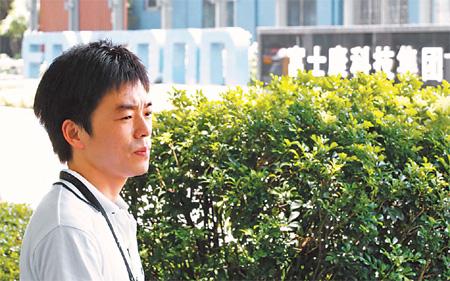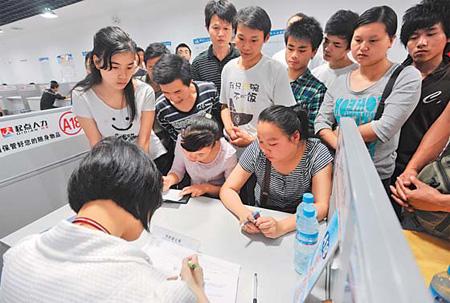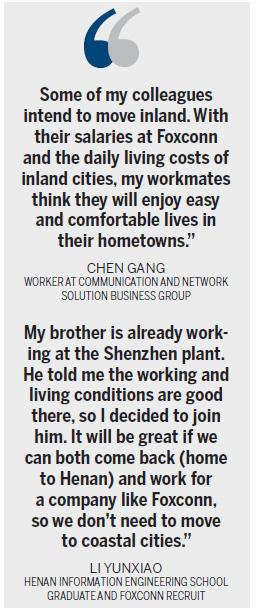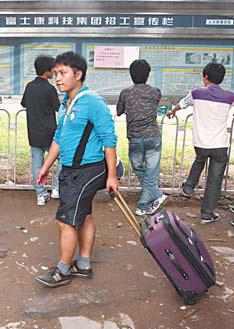
Chen Gang, who works for Foxconn's Communication and Network Solution Business Group, is reluctant to leave Shenzhen and says he will weigh his options if his division is relocated. [Zou Zhongpin / China Daily]
Central cities battle it out to lure electronics giant. Li Yuefeng in Henan, Zhang Yuchen in Shenzhen and Li Jing in Beijing reportInland cities are in fierce competition to be part of Foxconn Technology Group's huge repositioning plans, which were announced shortly after a series of suicides at the company's South China plants.
Zhengzhou in Henan province, Wuhan in Hubei, Chengdu in Sichuan and Langfang in Hebei are all listed as possible locations by the world's largest contract electronics maker, whose operations are currently centered in Shenzhen, an industrial hub in Guangdong province.
Although a final agreement is yet to be reached between the Zhengzhou government and Foxconn, recruitment has already started in this populous province in Central China.
A company document acquired by China Daily shows that the Taiwan-headquartered firm, whose clients include Apple and Sony, will hire 100,000 workers from 18 cities by Sept 20. As of June, about 38,000 people had already joined.
"They will all get internships at the Shenzhen plant for at least three months," said a human resources worker at Foxconn who did not want to be identified discussing the company's hiring policy. "The first batch of workers has already arrived there."
"It will take six months for the new plant in Henan to be constructed. The workers can choose to come back here when production facilities are ready," the HR employee added.
Foxconn hit the headlines this year for a string of 13 suicide attempts at its Shenzhen plant between January and May. All were aged 18 to 24, with most leaping from the top of one of its buildings. Ten people died.
Bosses attributed the deaths to personal problems suffered by the jumpers, yet the company received widespread criticism in the national and international media for its poor working conditions and treatment of staff. Investigations showed production line workers had to do overtime every day to make about 2,000 yuan ($300) a month.
However, the incidents have failed to deter leaders and migrant laborers in inland cities from pursuing opportunities with Foxconn.
A company recruitment point set up on July 1 at Henan Agricultural University in Zhengzhou has received hundreds of on-the-spot applications, as well as many via text message, e-mail and QQ instant messenger service.
In the first 10 days of this month, more than 500 people - mostly men - had applied for various positions, said a worker at the point who asked not to be named. He said about 60 percent were vocational school graduates, while 10 percent had college diplomas.
Foxconn is proving far more popular in the province than other companies, even those that offer similar payment packages. For many, the key point is the option of returning home.
"My brother is already working at the Shenzhen plant," said Li Yunxiao, a 19-year-old Henan Information Engineering School graduate at the company's college hiring point. "He told me the working and living conditions are good there, so I decided to join him.
"It will be great if we can both come back (home to Henan) and work for a company like Foxconn, so we don't need to move to coastal cities."

Applicants wait to sign for jobs at Foxconn's Wuhan plant on June 11 at a labor market in the capital city of Hubei province. Foxconn plans to recruit 28,000 workers by August. [Cheng Ying / for China Daily]
Building basesWith 20 plants in China employing more than 800,000 workers, Foxconn is a major player in the world of electronics manufacturing. Its Shenzhen factory, which houses 420,000 staff, is estimated to make roughly 70 percent of all Apple products, including the iPhone and iPad, as well goods for international brands like Hewlett-Packard and Dell.

Although details are still to be finalized, the Henan authorities have repeatedly expressed their willingness to provide the company with favorable conditions regarding land allocation, taxation and labor.
Foxconn spokesman Vincent Tong said this month the company also has plans to shift its major production line north from Shenzhen to Langfang in an attempt to reduce labor costs.
The company is also reportedly planning to invest $5 billion yuan in a new base in Chengdu, where another 100,000 people will be hired.
The relocation will likely be completed by the end of this year. After that, only about 100,000 workers who assemble the iPhone and iPad will remain in Shenzhen, said Tong.
Having several cities compete for the chance to host a Foxconn base is expected to drag down the relocation costs, with each province attempting to undercut the other.
While many media commentators suggested the spate of suicides was the ultimate reason company chairman Terry Gou decided to relocate production, the increased labor costs in coastal regions was no doubt a major factor in the decision.
Following the deaths, Foxconn in June boosted the monthly wage of its shop-floor workers in Shenzhen from 900 yuan to 1,200 yuan. Workers who pass a three-month assessment can also earn as much as 2,000 yuan.
A few weeks later, city officials also hiked the legally set minimum wage by almost 16 percent to 1,100 yuan. In Zhengzhou and Chengdu, the minimum wage is just 800 yuan and 850 yuan respectively.
Contract electronics manufacturers tend to operate on thin profit margins, about 5 percent, leaving most of the revenue to brand owners, technology patent holders and retailers. (ISuppli, a market research firm for the global electronics industry, estimates that the assembly fee for a $499 iPad is just short of $12.)
Cheap labor and large-scale production orders are key to ensuring huge revenue for factories, meaning that any change in wage levels, no matter how slight, will have a major impact on Foxconn's balance sheets.
Late last month, the company warned of increased losses in 2010 compared to last year, when it recorded a loss of $18.7 million.
However, bosses have consistently refused to point the finger at increased labor costs and instead suggest the dip is a result of weaker pricing and higher depreciation expenses.
"We believe the wage increase is healthy," chairman Gou told the Wall Street Journal recently. "It is negative to (our margin) in the short term but we believe it is positive in the long term."


A jobseeker leaves after being told Foxconn is not recruiting in Shenzhen. [Provided to China Daily]
Will they stay or go?While workers welcome the prospect of Foxconn relocating operations to their home cities, many already employed at its Shenzhen plant say they are reluctant to move with it.
"Yeah, the rumors are circulating that we'll be moved to inland areas of the country," said Chen Gang, "but I don't want to leave this city."
The 25-year-old, who buys cell phone components for Communication and Network Solution Business Group, a Foxconn's subsidiary, has only worked for the company for six months but has lived in the southern metropolis for more than two years.
"I've adapted well to the lifestyle in this modern city. It's like my second home," said Chen, who originally hails from Jingmen in Hubei province. "If I'm forced to leave Shenzhen, I'll consider looking at other job opportunities at other businesses within Foxconn. Otherwise, I'll just leave."
According to Chen, his department will move to Chongqing, although he did not know when.
Feng Difang, an assembly line worker, said he "can't imagine" the thought of leaving Shenzhen, even if it is to return to his hometown in Hebei.
Much of the reluctance to leave is fueled by the fact Foxconn has increased its workers' pay by about 30 percent, much higher than the minimum set by city government. However, some are more open to change.
"Some of my colleagues intend to move inland," said Chen. "With their salaries at Foxconn and the daily living costs of inland cities, my workmates think they will enjoy easy and comfortable lives in their hometowns, like Chongqing."
Jie Li, who works in the same group as Chen and has been with the company for three years, said he is looking forward to his proposed move to Tianjin next spring.
"I have no problem moving," said the 26-year-old, who comes from Guangyuan in Sichuan and hopes to see his pay raised 20 percent after he relocates. "Colleagues at the age of 30 may not take it as good news because they have family here. My girlfriend may leave me if I go."
Asked if he was worried about his girlfriend's reaction to the news, Jie smiled and said: "Schedules change so fast. Every day I hear a different rumor. It's all just unsettled.
"All we can be sure of is that half of our staff will move (to Tianjin), with more set to go as early as October," he added.
When asked about the suicides that have blighted the company's reputation, very few potential or current Foxconn employees seemed concerned about the intense media coverage the company has received this year.
"It's understandable that there will be pressure working for such a big company," said Henan graduate and job applicant Li Yunxiao. "That won't be a problem for me."
Mutual benefits
Industry analysts say Foxconn's decision to shift operations is a signal of a larger trend of labor-intensive businesses looking to move from "expensive" coastal cities to populous inland areas.
A study released in June by the Federation of Hong Kong Industries showed that 37 percent of the 80,000 Hong Kong companies with bases in the Pearl River Delta are planning to transfer part or all of their production operations.
More than 60 percent are prepared to move away from Guangdong province, said the federation report.
Foxconn's growth in Shenzhen has helped form a strong manufacturing industry value chain and contributed considerably to the city government's financial revenue, said Wei Dazhi, director of Shenzhen University's industrial economy center.
However, as the city gets more crowded (with 17,510 people per square kilometer, the city has the highest population density in the mainland) and as resources begin to become depleted, authorities are determined to encourage industrial upgrading through innovation-oriented, high-tech industries.
Meanwhile, inland cities are welcoming such a transition to create new economic growth engines. Both Henan and Sichuan are major sources of the country's huge army of migrant workers.
In such areas, industrialization and urbanization is still at a very early stage and the establishment of major manufacturing companies, such as Foxconn, will speed up that process, said Shi Pu, a professor at Henan University of Finance and Economics.
The demand for related services, such as logistics, can also foster new industries and create job opportunities, he said.
Yang Dongwei contributed to this story.





